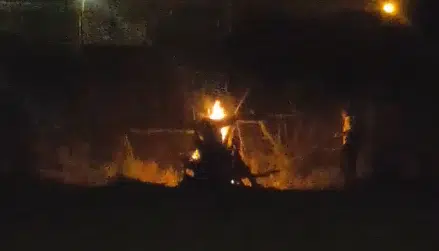
Kamloops man calls for punishment after witnessing huge bonfire on North Shore
KAMLOOPS — A Kamloops North Shore resident thinks something more should have been done to punish the man who lit a large bonfire in a nearby vacant lot Saturday.
Jeremy James was riding his bicycle home from work in the 300-block of Tranquille Road Saturday evening when he noticed a bonfire on a vacant property.
It was the same day that wildfire smoke was the thickest in the city.
VIDEO: (Courtesy Jeremy James)


